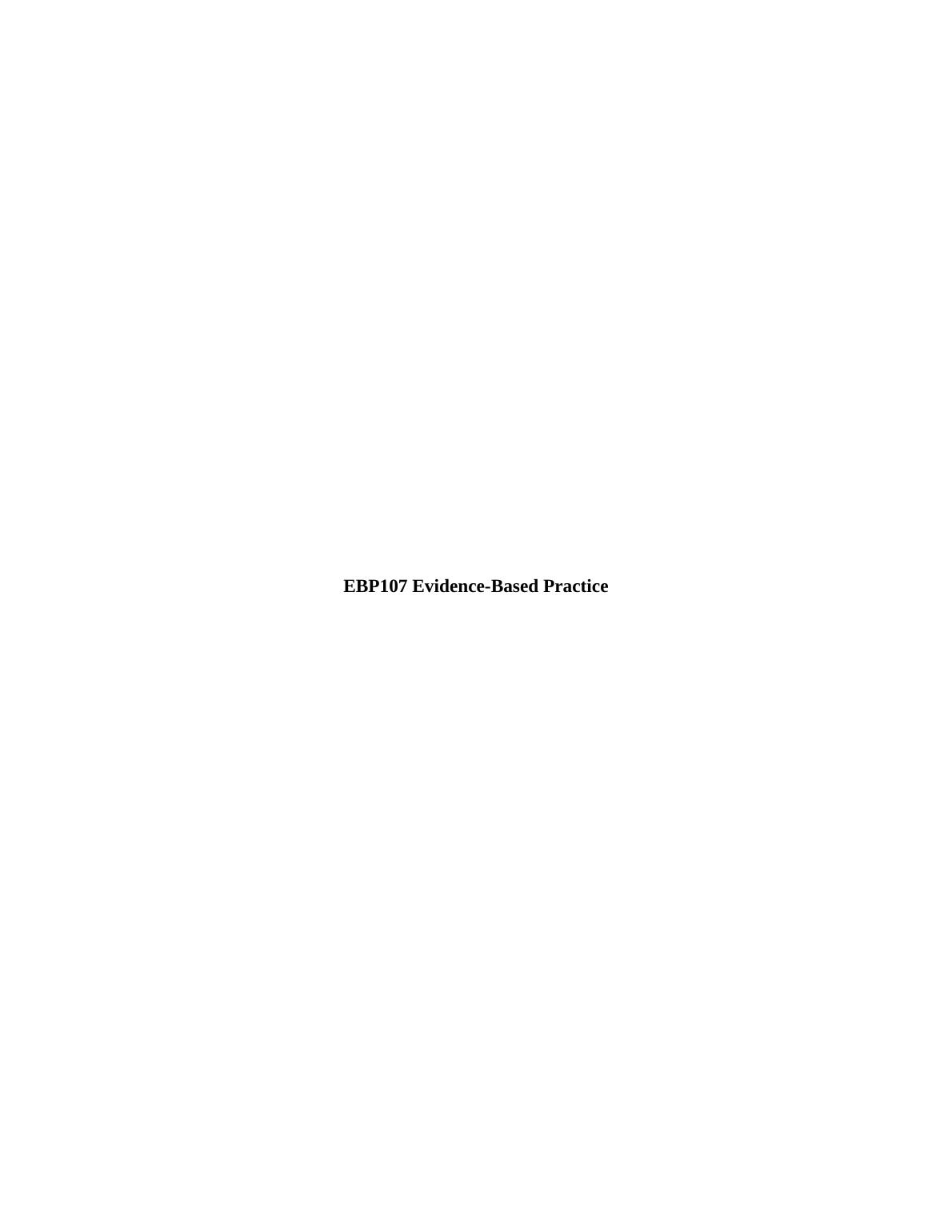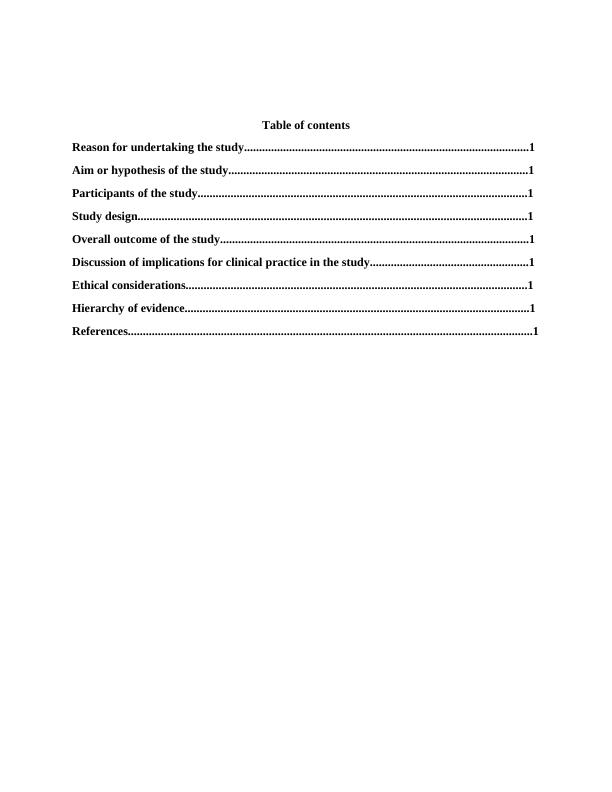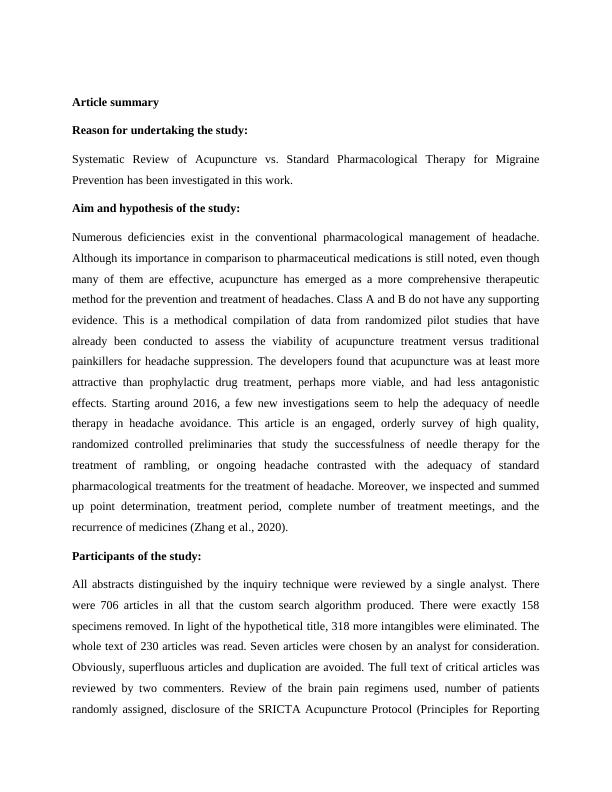Assessment: EBP107 Evidence-Based Practice
Added on 2022-11-22
7 Pages1794 Words2 Views
EBP107 Evidence-Based Practice

Table of contents
Reason for undertaking the study...............................................................................................1
Aim or hypothesis of the study....................................................................................................1
Participants of the study..............................................................................................................1
Study design..................................................................................................................................1
Overall outcome of the study.......................................................................................................1
Discussion of implications for clinical practice in the study.....................................................1
Ethical considerations..................................................................................................................1
Hierarchy of evidence...................................................................................................................1
References.......................................................................................................................................1
Reason for undertaking the study...............................................................................................1
Aim or hypothesis of the study....................................................................................................1
Participants of the study..............................................................................................................1
Study design..................................................................................................................................1
Overall outcome of the study.......................................................................................................1
Discussion of implications for clinical practice in the study.....................................................1
Ethical considerations..................................................................................................................1
Hierarchy of evidence...................................................................................................................1
References.......................................................................................................................................1

Article summary
Reason for undertaking the study:
Systematic Review of Acupuncture vs. Standard Pharmacological Therapy for Migraine
Prevention has been investigated in this work.
Aim and hypothesis of the study:
Numerous deficiencies exist in the conventional pharmacological management of headache.
Although its importance in comparison to pharmaceutical medications is still noted, even though
many of them are effective, acupuncture has emerged as a more comprehensive therapeutic
method for the prevention and treatment of headaches. Class A and B do not have any supporting
evidence. This is a methodical compilation of data from randomized pilot studies that have
already been conducted to assess the viability of acupuncture treatment versus traditional
painkillers for headache suppression. The developers found that acupuncture was at least more
attractive than prophylactic drug treatment, perhaps more viable, and had less antagonistic
effects. Starting around 2016, a few new investigations seem to help the adequacy of needle
therapy in headache avoidance. This article is an engaged, orderly survey of high quality,
randomized controlled preliminaries that study the successfulness of needle therapy for the
treatment of rambling, or ongoing headache contrasted with the adequacy of standard
pharmacological treatments for the treatment of headache. Moreover, we inspected and summed
up point determination, treatment period, complete number of treatment meetings, and the
recurrence of medicines (Zhang et al., 2020).
Participants of the study:
All abstracts distinguished by the inquiry technique were reviewed by a single analyst. There
were 706 articles in all that the custom search algorithm produced. There were exactly 158
specimens removed. In light of the hypothetical title, 318 more intangibles were eliminated. The
whole text of 230 articles was read. Seven articles were chosen by an analyst for consideration.
Obviously, superfluous articles and duplication are avoided. The full text of critical articles was
reviewed by two commenters. Review of the brain pain regimens used, number of patients
randomly assigned, disclosure of the SRICTA Acupuncture Protocol (Principles for Reporting
Reason for undertaking the study:
Systematic Review of Acupuncture vs. Standard Pharmacological Therapy for Migraine
Prevention has been investigated in this work.
Aim and hypothesis of the study:
Numerous deficiencies exist in the conventional pharmacological management of headache.
Although its importance in comparison to pharmaceutical medications is still noted, even though
many of them are effective, acupuncture has emerged as a more comprehensive therapeutic
method for the prevention and treatment of headaches. Class A and B do not have any supporting
evidence. This is a methodical compilation of data from randomized pilot studies that have
already been conducted to assess the viability of acupuncture treatment versus traditional
painkillers for headache suppression. The developers found that acupuncture was at least more
attractive than prophylactic drug treatment, perhaps more viable, and had less antagonistic
effects. Starting around 2016, a few new investigations seem to help the adequacy of needle
therapy in headache avoidance. This article is an engaged, orderly survey of high quality,
randomized controlled preliminaries that study the successfulness of needle therapy for the
treatment of rambling, or ongoing headache contrasted with the adequacy of standard
pharmacological treatments for the treatment of headache. Moreover, we inspected and summed
up point determination, treatment period, complete number of treatment meetings, and the
recurrence of medicines (Zhang et al., 2020).
Participants of the study:
All abstracts distinguished by the inquiry technique were reviewed by a single analyst. There
were 706 articles in all that the custom search algorithm produced. There were exactly 158
specimens removed. In light of the hypothetical title, 318 more intangibles were eliminated. The
whole text of 230 articles was read. Seven articles were chosen by an analyst for consideration.
Obviously, superfluous articles and duplication are avoided. The full text of critical articles was
reviewed by two commenters. Review of the brain pain regimens used, number of patients
randomly assigned, disclosure of the SRICTA Acupuncture Protocol (Principles for Reporting

End of preview
Want to access all the pages? Upload your documents or become a member.
Related Documents
Acupuncture to Treat Headache : Reportlg...
|13
|3048
|40
Acupuncture for Low Back Pain: An Overview of Systematic Reviewslg...
|5
|881
|60
Acupuncture: A Critical Analysislg...
|5
|1555
|316
700064FREBP Different Research Methodologieslg...
|8
|1145
|36
Systematic Review of Chronic Back Painlg...
|11
|3026
|238
Sleep Interventions in Hospitalized Patientslg...
|6
|1325
|388
